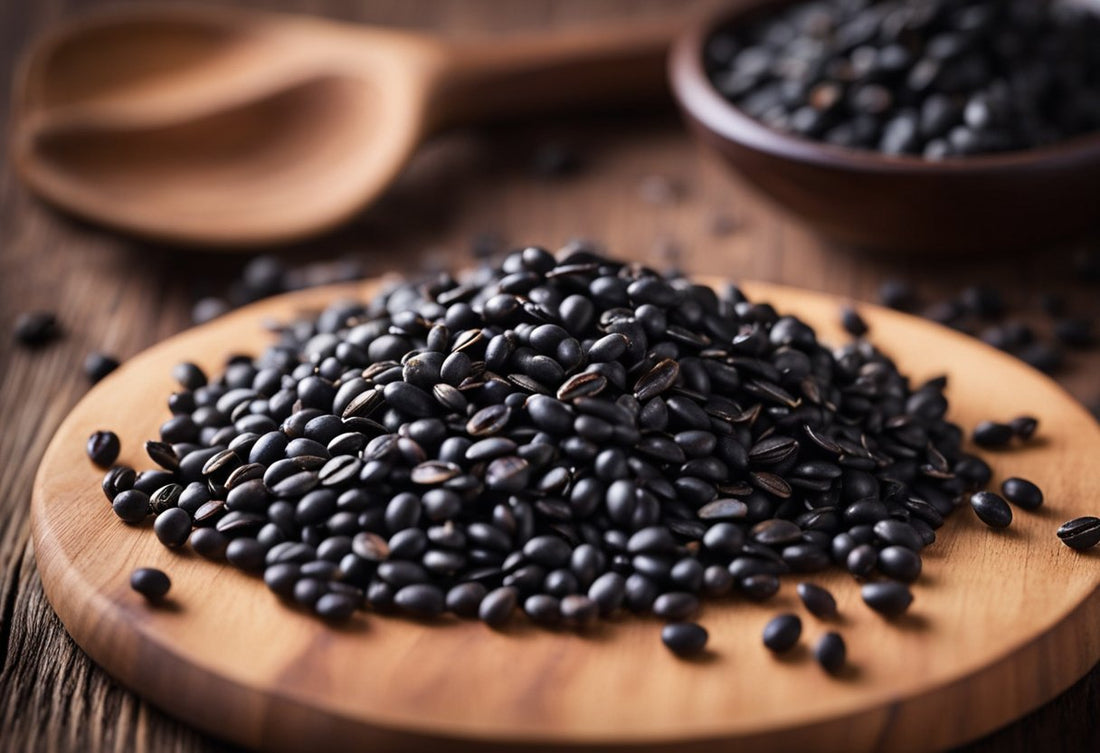
Kalonji: Unlocking the Health Benefits of Black Seed
Share
Kalonji, also known as Nigella Sativa or Black Seed, is a small yet powerful seed with a wide range of health benefits. Used for centuries in traditional medicine, these seeds offer properties that can support various aspects of health. Kalonji seeds are renowned for their antioxidant, anti-inflammatory, and antibacterial properties, making them a valuable addition to your wellness routine.
Incorporating black seed oil, derived from these seeds, can also be an effective way to harness their potential. This oil is praised for aiding in heart health, supporting blood sugar control, and even assisting with weight management. The versatility of Nigella Sativa in forms such as seeds and oil ensures that you have multiple ways to enjoy its benefits in your daily life.
Exploring the uses of kalonji can open the door to improved digestion and appetite enhancement. By acting as a digestive and carminative agent, it helps in releasing intestinal gas and improving overall gut health. Whether you choose to use kalonji seeds directly in your cooking or opt for black seed oil as a supplement, you're likely to find these small seeds make a significant impact on your health journey.
Historical Background and Culinary Uses

Kalonji, known for its diverse names and rich history, holds a significant place in both traditional medicine and culinary practices. This section delves into its origins, its role in traditional healing methods, and its varied use in cooking.
Origins and Naming
Kalonji, scientifically recognized as Nigella sativa, has a long history dating back to ancient civilizations where it was known by many names. The seed, often referred to as black cumin, is native to regions like southwestern Asia and the Mediterranean. Its various names, including Roman coriander and black caraway, highlight its versatility across cultures. The name "Nigella" is derived from the Latin word "niger," meaning black, which describes the seed's dark color. Over centuries, kalonji has been introduced into different languages and contexts, building a legacy that spans continents and traditions.
Kalonji in Traditional Medicine
In the realm of traditional medicine, kalonji is renowned for its purported health benefits. Known as "the seeds of blessing," it has been utilized to remedy various ailments due to its potential anti-inflammatory and antioxidant properties. Historical usage in herbal medicine includes treatments for respiratory disorders, inflammatory conditions, and digestive issues. The oil extracted from the seeds, black seed oil, is particularly valued for its therapeutic properties. Kalonji’s integration into medicinal practices showcases its longstanding credibility as a natural remedy across cultures.
Culinary Practices
As a spice, kalonji is an integral component of South Asian cuisine and other culinary traditions. It adds a distinct flavor and aroma to dishes, making it a popular addition in baking, pickling, and seasoning. The seeds are sprinkled on naan, incorporated into spice blends, and used to enhance curries and lentil dishes. Kalonji’s ability to complement different flavors makes it versatile, while its roles as fennel flower and Roman coriander highlight unique culinary adaptations. From traditional breads to contemporary cuisine, its applications are diverse, reflecting kalonji's adaptability in the kitchen.
Nutritional Profile and Medicinal Properties

Kalonji, also known as black seed, offers a rich array of nutritional benefits and medicinal properties. Known for its potent bioactive compounds, it’s valued for its antioxidant and anti-inflammatory effects.
Phytochemicals and Antioxidants
Kalonji seeds are rich in phytochemicals including thymoquinone, known for its antioxidative and anti-inflammatory properties. The seeds also have other compounds such as carvacrol, t-anethole, and 4-terpineol, which contribute to their antioxidant capacity. These elements neutralize free radicals and reduce inflammation, making the seeds beneficial in managing oxidative stress. Kalonji's unique makeup offers a natural defense against cellular damage, highlighting its medicinal potential.
Potential Health Benefits
Kalonji is known for its wide range of medicinal properties. The seeds possess notable antibacterial properties, supporting your immune system in fighting infections. Additionally, they may help manage gastrointestinal issues by protecting the stomach lining. The seeds also show promise in assisting with blood sugar regulation and promoting heart health. Regular consumption might aid in lowering cholesterol levels, contributing to cardiovascular wellness.
Oil and Extract Uses
Kalonji oil, extracted from seeds, is rich in essential nutrients and used in numerous traditional remedies. It is beneficial for skin and hair health, often used in topical applications to address conditions like dandruff and scalp inflammation. The oil's potent compounds support healing and can aid in reducing joint inflammation when used as a massage oil. Its versatility makes it a popular choice in natural medicine. For more, it's worth checking out kalonji's usage in diverse applications.
Health Benefits and Therapeutic Uses
Kalonji, also known as black seed, offers a range of health benefits. It may lower LDL cholesterol, support diabetes management, alleviate inflammation, aid in weight management, and protect liver health.
Cholesterol and Heart Health
Kalonji may have positive effects on heart health by targeting cholesterol levels. It can help lower low-density lipoprotein (LDL) cholesterol and triglycerides, which are linked to heart disease. By potentially increasing high-density lipoprotein (HDL) cholesterol, kalonji fosters better heart function and circulation. You might incorporate kalonji into your diet to aid heart health.
Diabetes and Blood Sugar Control
For those managing diabetes, kalonji can help control blood sugar levels. It may improve insulin sensitivity, which is crucial for regulating blood glucose levels. Kalonji may also mitigate complications associated with diabetes, offering a natural support method for individuals aiming to maintain stable blood sugar. Consuming kalonji may contribute to better diabetes management, according to various sources.
Inflammatory Conditions and Arthritis
Kalonji is known for its anti-inflammatory effects, which can provide relief for arthritis and other inflammatory conditions. Its properties might reduce joint pain and swelling, making it a useful supplement for maintaining joint mobility. Including kalonji in your healthcare regimen can be beneficial if you're dealing with persistent inflammation.
Weight Management
Supporting weight management efforts, kalonji may help control appetite and promote fat loss. It has components that may assist in monitoring body weight and improving metabolism. Regular intake can make it easier for you to manage weight effectively, aiding in overall wellness without drastic lifestyle changes. Investigate the benefits of kalonji for weight loss initiatives.
Digestive System and Liver Health
Kalonji can positively impact digestive health by alleviating issues such as indigestion and stomach ulcers. It also promotes liver function and might help protect against liver damage by modulating liver enzymes. For those experiencing digestive troubles or looking to enhance liver health, incorporating kalonji into your diet could provide beneficial support, as found in research.
Considerations for Consumption
Kalonji, also known as black cumin or nigella seeds, offers numerous health benefits but requires careful consumption to avoid potential side effects. Understanding how to properly include it in your daily diet and what risks to be mindful of will ensure its safe use as a natural remedy.
Usage Recommendations
Incorporating kalonji into your diet can be straightforward. You might enjoy it sprinkled over bread or salads or incorporate it when cooking dishes like curry. For ease, some opt to use its extracted form, black seed oil, which can be added to smoothies or taken directly.
To reap health benefits without adverse effects, start with small quantities. Typically, using a half to one teaspoon of kalonji seeds per day is recommended. If using as a flavor enhancer, you may toast the seeds first to release their full aroma and taste.
Side Effects and Safety
While kalonji is generally safe, excessive consumption can lead to side effects. Some may experience allergic reactions, particularly if they have sensitive skin or allergies to plants in the buttercup family. Others may notice a drop in blood pressure, which is crucial for individuals on hypertension medications to consider.
Consult a healthcare provider before significantly increasing your kalonji intake, especially if you're planning to use it as a therapeutic natural remedy. Pregnant women and those planning surgeries should be especially cautious. Always maintain a balance, and adjust your consumption based on specific health needs and professional advice.
Frequently Asked Questions
Kalonji, also known as black seed, offers various health benefits and is easily incorporated into meals. Its significance in certain traditions and potential gender-specific benefits are also worth noting.
What are the benefits of using kalonji for females?
Kalonji is believed to support hormonal balance and improve skin health. It may aid in managing menstrual discomfort and alleviate symptoms related to hormonal fluctuations thanks to its anti-inflammatory properties. Incorporating kalonji into your wellness routine can provide these benefits.
How can kalonji be incorporated into a daily diet?
You can take kalonji in a convenient 520 mg liquid gel capsule as black seed oil, or sprinkle it on salads, mix it into bread or pastry dough, or garnish curries and soups for added flavor. Consuming it directly with warm water or adding it to smoothies are other convenient ways to include kalonji in your diet.
What is the significance of kalonji in Islamic tradition?
In Islamic tradition, kalonji is considered a blessed seed and is mentioned in the Hadith. It is often used in traditional medicine for its perceived healing properties, offering a connection to spiritual practices and health.
Are there any particular benefits of kalonji for males?
Kalonji may enhance stamina and support prostate health due to its antioxidant and anti-inflammatory properties. It can also contribute to improved skin condition and hair health. Including kalonji in your diet may offer these male-specific advantages.
Can you differentiate between black cumin and kalonji?
Though often used interchangeably, black cumin and kalonji are different. Kalonji refers specifically to Nigella sativa, while black cumin can also mean Bunium bulbocastanum. It's important to understand this distinction when purchasing or using these seeds.
Are there any restrictions on who should consume kalonji seeds?
Kalonji should be consumed in moderation. Pregnant women and individuals with low blood pressure should consult healthcare professionals before using it regularly. It's important to understand the potential contraindications to ensure safe consumption.
